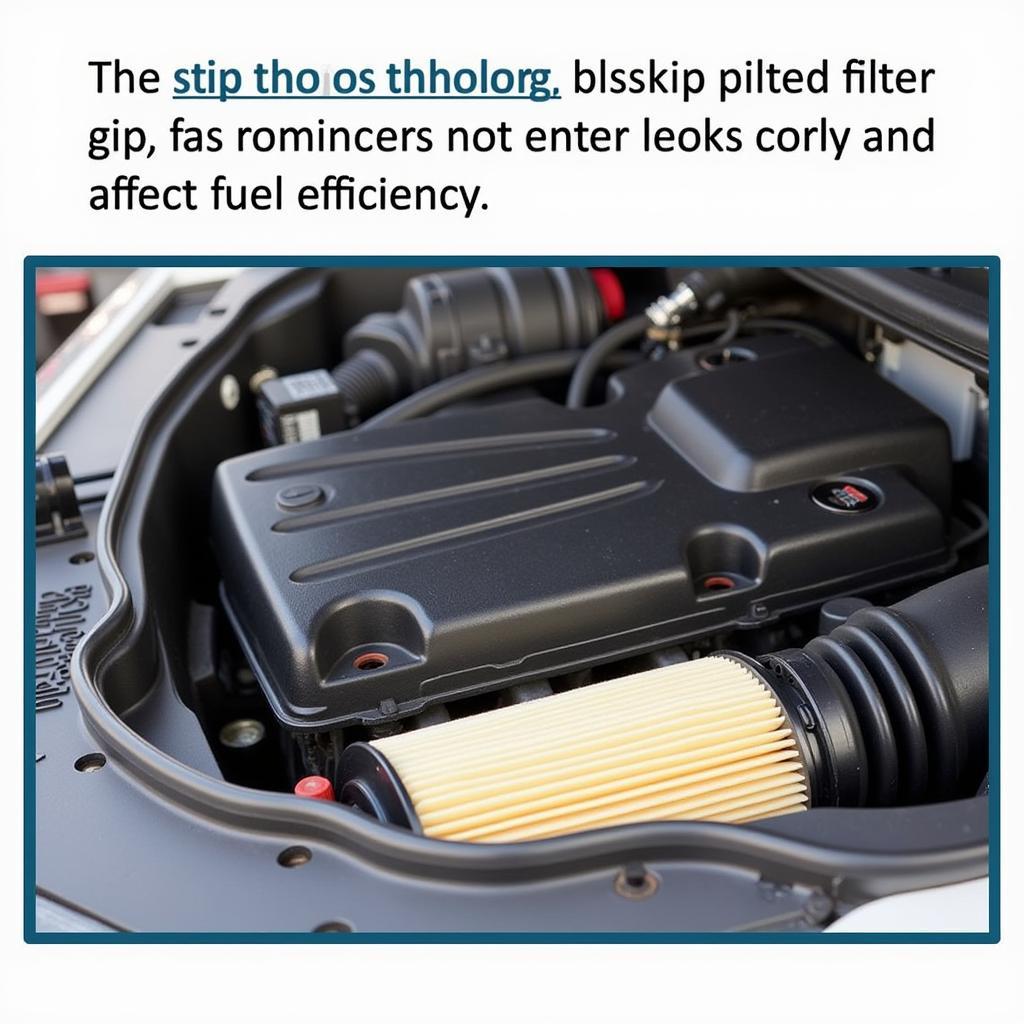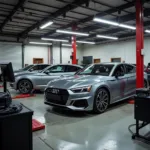After car service, experiencing higher fuel consumption can be frustrating. This article explores common reasons why your car might be guzzling more gas after a service and provides practical solutions to help you regain your fuel efficiency.
Common Culprits Behind Increased Fuel Consumption After Car Service
Several factors can contribute to increased fuel consumption after a service. Sometimes, the service itself can inadvertently cause issues, while other times, it simply reveals pre-existing problems.
Incorrectly Installed Parts or Components
A simple mistake during service, such as an improperly installed air filter or a faulty oxygen sensor, can significantly impact fuel economy. A dirty or clogged air filter restricts airflow to the engine, leading to a richer fuel mixture and higher fuel consumption. Similarly, a malfunctioning oxygen sensor can provide inaccurate readings to the engine control unit (ECU), resulting in an inefficient air-fuel mixture.
Changes in Driving Habits
While not directly related to the service itself, changes in your driving style after getting your car back can affect fuel consumption. If you’ve been enjoying the improved performance after a tune-up, you might be accelerating more aggressively or driving at higher speeds, both of which consume more fuel.
Underlying Mechanical Issues
Sometimes, a car service can highlight underlying mechanical problems that were previously masked. For example, a worn-out fuel pump or a failing catalytic converter can lead to increased fuel consumption. The service might not have caused these issues, but it could have brought them to your attention.
 Incorrectly Installed Air Filter
Incorrectly Installed Air Filter
Troubleshooting and Solutions
If you notice your car consuming more fuel after a service, don’t panic. Here’s a step-by-step guide to help you identify and address the problem:
- Check the service records: Review the service records carefully to see what work was performed. This can provide clues about potential causes for the increased fuel consumption.
- Inspect the air filter: Ensure the air filter is clean and correctly installed. Replace it if necessary.
- Check tire pressure: Make sure your tires are inflated to the recommended pressure. Under-inflated tires increase rolling resistance, leading to higher fuel consumption.
- Monitor your driving habits: Be mindful of your driving style. Avoid aggressive acceleration and maintain a steady speed whenever possible.
- Consult a qualified mechanic: If you can’t identify the cause, take your car back to the mechanic who performed the service or consult another qualified professional. They can diagnose the issue using specialized diagnostic tools and recommend appropriate repairs.
Why is My Car Using More Gas After a Tune-Up?
A tune-up is designed to improve engine performance and fuel efficiency. However, in some cases, it can lead to temporarily increased fuel consumption. This can occur if the ECU needs time to relearn optimal fuel delivery parameters after adjustments are made during the tune-up.
“After a tune-up, it’s not uncommon for a car’s computer to need a little time to readjust,” says John Smith, Automotive Engineer at Advanced Auto Solutions. “This learning period can sometimes result in slightly higher fuel consumption initially.”
Addressing Fuel Consumption After a Tune-Up
If you experience increased fuel consumption after a tune-up, allow the car to run for a few driving cycles. The ECU should adapt and optimize fuel delivery over time, restoring fuel efficiency to normal or even improved levels.
Conclusion: Regaining Control of Your Fuel Economy
Increased fuel consumption after a car service can be caused by various factors, from simple oversights to underlying mechanical problems. By carefully reviewing the service records, inspecting key components, and monitoring your driving habits, you can often pinpoint the cause and take corrective action. Don’t hesitate to consult a qualified mechanic if you need professional assistance. Regaining control of your fuel economy ensures a smooth, efficient, and cost-effective driving experience.
FAQ
- Is it normal for fuel consumption to increase after a car service? While not always the case, it can happen due to various reasons explained in this article.
- How can I tell if the air filter is causing the problem? A visibly dirty or clogged air filter is a clear indicator. Replacing it is a relatively inexpensive and easy fix.
- Should I take my car back to the mechanic if the problem persists? Absolutely. A qualified mechanic can diagnose and fix the issue accurately.
- Could a faulty oxygen sensor be the culprit? Yes, a malfunctioning oxygen sensor can disrupt the air-fuel mixture, leading to increased fuel consumption.
- How long does the ECU take to adapt after a tune-up? It typically takes a few driving cycles for the ECU to relearn optimal fuel delivery parameters.
- What if my tires are properly inflated, but the fuel consumption is still high? Other mechanical issues could be at play, requiring professional diagnosis.
- Can driving habits affect fuel consumption after a service? Yes, aggressive acceleration and high speeds can significantly increase fuel consumption regardless of recent service.
Need further assistance? Contact us via WhatsApp: +1(641)206-8880, Email: [email protected] or visit our office at 456 Oak Avenue, Miami, FL 33101, USA. Our 24/7 customer support team is ready to help.

